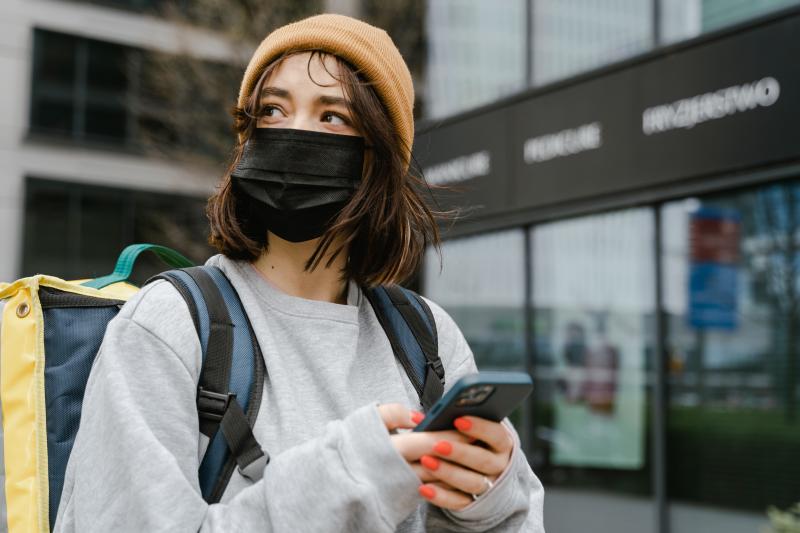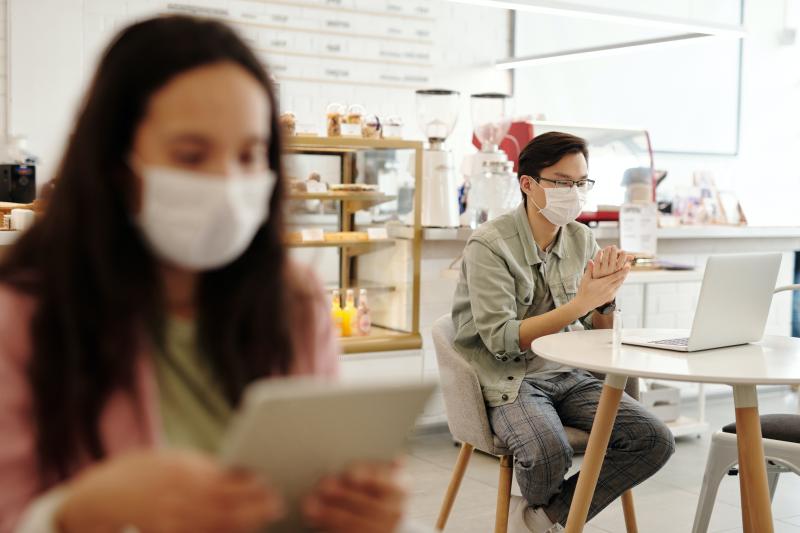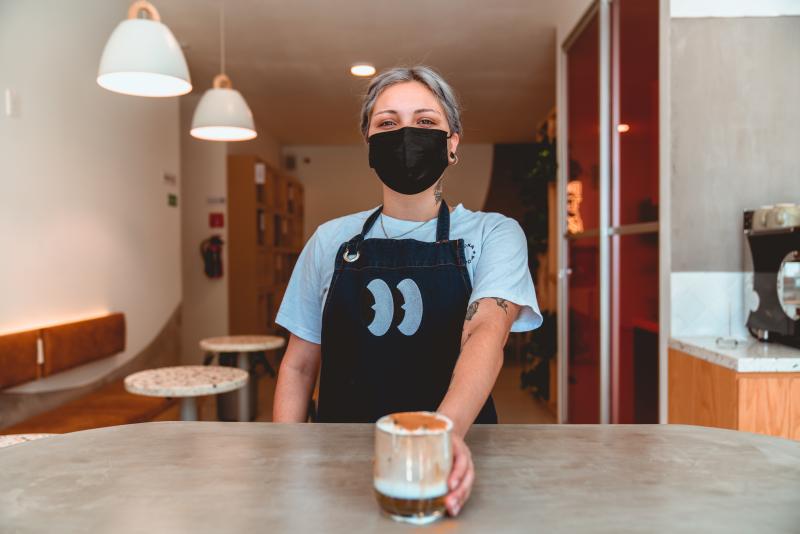
* Erasmus Generation Perspective articles are written by ESN volunteers with the aim to share the student voice on current policy developments in the field of international education. The text represents the individual perspective of the author and not an official statement of the Erasmus Student Network.
The following article was based on open sources and the survey conducted by the ESN International Committee for Education.
In January 2020, the World Health Organization (WHO) declared the outbreak of a new coronavirus disease, COVID-19, to be a Public Health Emergency of International Concern. With the pandemic entering our lives, many aspects of our regular habits have changed. There are views and outcomes considering the effects of a pandemic on all individuals, including students. Unfortunately, great quantities of them fall on the negative side. Many sources stated that it led to the closure of educational institutes, which is a source of many students to cope with numerous personal issues. Erasmus exchange is one of the areas that are adversely affected by the current situation. Many Erasmus students endeavour to adapt to the host culture due to the isolation and cope with the restrictions.
This article focuses on Erasmus students’ motivational attitudes on restrictions and mental health during the COVID-19 pandemic and to understand the reasons behind various Erasmus habits to find solutions to possible problems For the article to be more comprehensive, it is divided into three parts that are based on the survey which was conducted for this article. The mentioned parts are the motivation for Erasmus during the pandemic, the attitude of Erasmus students on COVID-19 restrictions and mental health.
Let’s begin by talking about the before discussed motivation for Erasmus during the pandemic. During the study period, young people are preparing themselves for independent adult life as well as learning the skills needed for the future professional career. One of the greatest possibilities to enrich one’s university experience is to benefit from mobility programs such as Erasmus. While students are offered various mobility programs, Erasmus holds the leading position in terms of popularity among European Universities and which also became a byword for the student exchanges. However, usual university and mobility habits were interrupted by the pandemic.

The unexpected and rapid spread of the COVID-19 virus is known to have had a significant impact on higher education and based on the data provided by European Commission, student mobility was impacted the most in comparison with other university practices. Still, the pandemic did not cause students to lose their desire for Erasmus adventure. Thus, it is interesting to look into the reasons behind the decision to do the exchange in this challenging time of the pandemic.
But why take such a risk in the times of COVID-19 and move to another country? Regardless of the study modality offered by the university of exchange destination, more than 87 % of respondents of our survey chose to do Erasmus on-site and only the minority had their Erasmus online. Things start to become clearer when we see that slightly more than one-third of respondents chose to take part in Erasmus during the pandemic as it was their last chance to benefit from student mobility. Students named that it was the last year of their degree program or it was the last semester suitable for exchanges. Around 10% stated that they felt better off in the Erasmus destination country than at home. Running from strict COVID-19 regulations or even lockdown were mentioned among the main reasons. Also, the chance to move during pandemic students saw as a unique opportunity to escape from pandemic routine and by doing so explore new sights. Other reasons for Erasmus during the pandemic were mainly related to personal development and growth. Students felt driven to take the exchange opportunity because of travel, quality education, independence and other related reasons.
When speaking on what motivated students to choose the specific country of mobility destination, the results of the survey can be divided into four sections: cultural motivation; education and learning; budget; social life and personal reasons. The cultural motivation section covers such reasons as culture and travel. It is worth mentioning that most respondents chose cultural motivation and reasons falling under this section. In second place in terms of popularity, respondents mentioned that they feel motivated by the opportunity to learn the language and to have quality education. Approximately 40 % of respondents stated that the decision on the destination was circumstanced by the budget. The rest of the incentives were related to social or personal reasons including the nightlife.
While Erasmus mobility is well known to be a great chance to enhance the CV of young professionals, it was surely not among the main motivations of the respondents who were willing to participate in the research. As it was proved by the survey results, the main motivation to take part in Erasmus is not conditioned by the pandemic and students, led by various motives, still chose to take a risk and challenge themselves while studying and living abroad. Motivations directly related with COVID-19 reached only around 10%, leading to conclusions that even during the times of pandemic international study mobility is driven mainly by students’ desire to grow and develop new professional and personal skills while also focusing on social life when meeting people from different cultural backgrounds despite restrictions.

Talking about restrictions, do the restrictions make sense? Regardless of what one might say one thing is certain - they led us, as a worldwide population, to a behavioural change. How to protect yourself against Covid-19 has now become common knowledge. But it has not always been like that. Especially last February everyone was still pretty clueless on what to do. Ever since the beginning of the last year, different countries have started introducing various restrictions which heavily affected all the exchange students. But how exactly did they affect them? Is Covid-19 the reason behind illegal social activities or is it the specific restrictions that resulted in them? Is there any correlation at all?
Let’s focus on the answers that the respondents shared with us. Even though some researchers claim that e-learning is equally efficient to conventional learning, the respondents of this survey proved otherwise. 43% of the respondents had only online classes during their exchange. Around 63% say that their education has been impacted negatively by the restrictions. Only 5% believe that the restrictions helped their education. There are many limitations to this question though, such as each university's facilities, difficulties with sourcing material etc. Having said that, it is difficult to draw any definite conclusions.
When asked how affected by the restrictions they were, striking 79% said negatively which doesn’t come as a surprise. If both education and personal lives were affected but in a slightly different amount, It could mean that the precautions that different countries took impacted it. The majority of those who were impacted positively in either one or both categories took part in a mixed modality Erasmus, which indicates that the looser restrictions made it better for many. Could it be that in some countries restrictions gave students a sense of security while not being overwhelming?
Even though at the beginning of 2020 Italy was one of the most affected European countries, it seems like the students were not impacted by the restrictions in Italy as much as other countries. The most positively affected respondents did their exchange in Italy or Romania. 15% of Italy’s populations caught Covid-19 whereas in Romania the count was 19%. In comparison to other European countries these statistics are quite high (17% - Turkey, 12.5% - Portugal, 10.5% - Lithuania, 13% - Poland, 6,5% - Czechia). Let’s compare how restrictive the restrictions were.
Italy’s education system suffered a backlash from the media about being the reason for the second wave of Covid-19. As a result, most higher education teachings were held online or/and in class in moderation. When it comes to other restrictions that were impacting citizens’ lives, as everywhere, it fluctuated. In October 2020, most leisure facilities had to be temporarily shut, but gastronomy was relatively thriving, restaurants and bars being open until 6 pm. Face coverings were compulsory. The travel ban was of course there. Was it the open bars that made people feel better?

In Romania, the Covid-19 restrictions differed according to the county. They were divided into red, yellow, and green meaning more drastic restrictions if a county is ‘red’ and fewer restrictions overall if the county was ‘green’. Yellow and green zones were allowed to organise in-person classes. The public facilities were allowed to stay open to some per cent of the full capacity. While we have no data on why the respondents were happier in Romania than in other countries, we can assume that it was thanks to possibly more efficient restrictions.
We can raise many more questions on this very topic. Restrictions are here and it seems that they are not going anywhere for at least the imminent future. On the other hand, they do have a toll on our mental health.
The restrictions, which came into force to fight against the global pandemic, created many debates on obedience and mental health. As mentioned before, Erasmus students’ attitudes are mainly negative towards the restrictions resulting from various reasons. The restrictions, which promote isolation for the sake of the community’s welfare, foster the possible negative effects on mental health. Individuals, families, and communities experience feelings of hopelessness, despair, grief, bereavement, and a profound loss of purpose because of pandemics. Many studies have consistently found relationships between the occurrence of infectious disease outbreaks and a host of psychological and behavioural consequences.
To cope with the dismissive bringing of COVID-19, individuals either find their ways for better well-being or simply ignore the restrictions to continue their “normal” life. Therefore, the third focus of this study is on the mental state of Erasmus students during the pandemic to find out if there is any correlation between the well-being of Erasmus students with disobedience of the restrictions.
The results of the survey show that 61% of the participants are affected negatively in terms of mental health, 27,5% state that their well-being is not affected by any means. Only 11,5% of the Erasmus exchange students stated that their mental health is positively affected. Among the positively affected exchange students, Portugal takes a greater ratio followed by Italy.
The possible reasons for the negative impact might be the fear of being infected, the feeling of loneliness, or lack of socialisation. For example, in Hong Kong, about 70% of people expressed anxiety about getting SARS and people reported they believed they were more likely to contract SARS than the common cold. Therefore, they might have an urge to comply with the restrictions and be in isolation. On the other hand, many people may want to seek more opportunities for interaction with other individuals or participate in illegal social activities as a means of refraining from severe well-being problems.
Regarding the effects of COVID-19 on mental health, there is another question in mind - is there enough support for Erasmus Students to cope with related issues? The conducted study reveals that 45.5% of the students think that they have enough support regarding mental health, while 54.5% state the opposite. However, many possibilities are coming from the limitations - the social and economic status of the exchange students, as well as the facilities that both home and the host universities offer. To manage the possible destructive effects of the pandemic, students must receive sufficient support from their friends, families, host, and sending institutions. A study held in German Universities in 2016 showed that time latitude and social support by students were proven to be significant predictors for anxiety, contributing to 16% of the total variance. The International Journal of Nursing Mental Health suggests that setting up regular phone calls or video conferences with family, friends, and colleagues can bridge the gaps brought on by social distancing. Therefore, as individuals, we need to be aware of the importance of social support and professional help to maintain our well-being during these difficult times.
The last focus of the study is the relationship between the disobedience of the restrictions with its possible motives, such as mental health and the image of the Erasmus+ Programme. The findings illustrate that 63.5% of the survey takers participated in illegal social activities regarding COVID-19 restrictions, while the rest stated that they did not take part in it.

When asked to choose more than one reason behind the involvement in illegal social activities, “to socialise” was chosen by almost ⅔ of participants and seems to be the highest motivation. The second most chosen option is “to have fun” with half of the people choosing it. The answer “To have the “full” Erasmus experience with the 48.8% rate brings about another issue on the image of the program itself contrary to the main visions and missions of the Erasmus. To our surprise, improving mental health was selected by 35,9% of the participants, positioning it to be the second-lowest motivation in taking part in illegal social activities during the pandemic. “Improving foreign language“ seems to be the lowest reason with 26,3. After analysing the results, many questions might arise. As social beings, we require communication and entertainment accompanied by a better mental state. This leads to the fact that the foremost motivations seem to be our initial needs behind the illegal social activities breaking the restrictions.
Summing up, COVID-19 interfered with everyone's plans. Whether we consider only education or personal lives one thing is certain, going on an exchange nowadays is a challenge that comes along with the Learning Agreement. Students are quite lucky to be able to go on the exchange even though it's not always something they would've hoped for. Though different countries deal with the pandemic in different ways some sort of restrictions are everywhere. Unfortunately, they take a toll on various things, especially our mental health which could be the reason for illegal activities but not necessarily. The limitations to this topic are so vast that we simply cannot predict what will make exchanges easier. If you are interested to know more about this topic, stay tuned for the ESN Survey 2021 report.
Sources:
https://ec.europa.eu/programmes/erasmus-plus/resources/documents/coronav...
http://yadda.icm.edu.pl/yadda/element/bwmeta1.element.baztech-0e58bed4-c...
https://ec.europa.eu/programmes/erasmus-plus/resources/coronavirus-impac...
https://link.springer.com/article/10.1007/s10734-015-9871-0
https://op.europa.eu/en/publication-detail/-/publication/94d97f5c-7ae2-1...
https://www.dw.com/en/coronavirus-is-the-eus-erasmus-program-under-threa...
https://www.europarl.europa.eu/news/en/headlines/society/20200429STO7817...
https://www.ilsole24ore.com/art/nessuno-stop-l-erasmus-si-comincia-remot...
https://bmcmedicine.biomedcentral.com/articles/10.1186/s12916-021-01924-7
https://www.sciencedirect.com/science/article/pii/S019074092032288X
https://www.ons.gov.uk/peoplepopulationandcommunity/educationandchildcar...
https://www.worldometers.info/coronavirus/
https://www.thelancet.com/journals/lanepe/article/PIIS2666-7762(21)00069-7/fulltext
https://eacea.ec.europa.eu/national-policies/eurydice/content/how-covid-...
https://eacea.ec.europa.eu/national-policies/eurydice/content/how-covid-...
https://www.garda.com/crisis24/news-alerts/392941/italy-authorities-anno...
https://travelbans.org/europe/romania/
https://www.romania-insider.com/coronavirus-situation-restrictions-roman...
https://apps.who.int/iris/bitstream/handle/10665/331490/WHO-2019-nCoV-Me...
https://assets.researchsquare.com/files/rs-30128/v1/994fd6d6-496a-47ae-b...
https://www.ncbi.nlm.nih.gov/pmc/articles/PMC7122898/
https://experts.illinois.edu/en/publications/taking-control-amidst-the-c...
https://onlinelibrary.wiley.com/doi/full/10.1111/inm.12726
https://www.ipsos.com/ipsos-mori/en-uk/Covid-19-and-mental-wellbeing
https://www.springermedizin.de/mental-health-problems-among-university-s...

Follow ESN